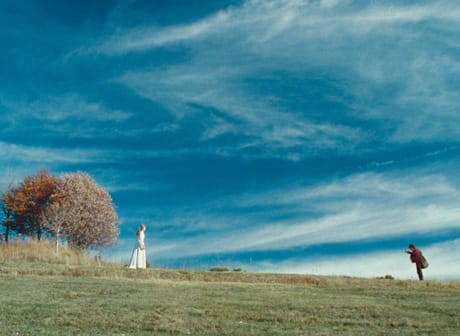A disturbing fairy tale set in 1865 in the south of France, Deep in the Woods follows the travels of a wild man named Timotheé as he encounters Josephine, the beautiful daughter of a country doctor.
First appearing mute, Timotheé eventually declares himself the son of God, but puts a trance on Josephine, willing her to obey his every command. Raped and abused frequently, Josephine nonetheless grows increasingly attracted to Timotheé, and the audience is meant to wonder how much of Josephine's following is a spell or mere seduction. The answer is never totally clear, so the audience is never comfortable.
The tone isn't quite as lurid as it sounds on paper, despite the mass walkouts witnessed at the screening. There is a slightly pulpy '70s vibe in the use of malicious zoom cuts in earlier shots, and foreboding horns in the score, which can either add to or undercut the tension, depending on the viewer.
Both leads are unnerving to the core as well. Nahuel Perez Biscayart possesses a genuinely unhinged presence as Timotheé, with no plays for empathy or even understanding. His boyish face and dirty mop of hair betray a deviant, disturbing agenda for his character. Islid Le Besco is similarly fascinating as Josephine, radiating a beatific mystery, allowing the viewer to imagine unending possibilities for the character. Unfortunately, these possibilities are never fully realized, as Jacquot flip-flops to a courtroom examination of Timotheé and Josephine's affair in the film's last section, which drains the life from the sordid spark created earlier on.
At this point, Jacquot loses the characters' focus and the leads' dynamic becomes disappointingly inconsistent. Jacquot does keep the audience guessing until the end, but satisfactory answers cannot be guaranteed.
(Ciné-@)First appearing mute, Timotheé eventually declares himself the son of God, but puts a trance on Josephine, willing her to obey his every command. Raped and abused frequently, Josephine nonetheless grows increasingly attracted to Timotheé, and the audience is meant to wonder how much of Josephine's following is a spell or mere seduction. The answer is never totally clear, so the audience is never comfortable.
The tone isn't quite as lurid as it sounds on paper, despite the mass walkouts witnessed at the screening. There is a slightly pulpy '70s vibe in the use of malicious zoom cuts in earlier shots, and foreboding horns in the score, which can either add to or undercut the tension, depending on the viewer.
Both leads are unnerving to the core as well. Nahuel Perez Biscayart possesses a genuinely unhinged presence as Timotheé, with no plays for empathy or even understanding. His boyish face and dirty mop of hair betray a deviant, disturbing agenda for his character. Islid Le Besco is similarly fascinating as Josephine, radiating a beatific mystery, allowing the viewer to imagine unending possibilities for the character. Unfortunately, these possibilities are never fully realized, as Jacquot flip-flops to a courtroom examination of Timotheé and Josephine's affair in the film's last section, which drains the life from the sordid spark created earlier on.
At this point, Jacquot loses the characters' focus and the leads' dynamic becomes disappointingly inconsistent. Jacquot does keep the audience guessing until the end, but satisfactory answers cannot be guaranteed.
